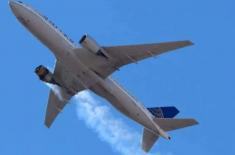
ISPR-PRESS ***TWO*** ISLAMABAD *** LAST ***
Umer Jamshaid Published May 12, 2025 | 12:50 AM

RAWALPINDI, (UrduPoint / Pakistan Point News - 12th May, 2025) Director General of the Inter-Services Public Relations (ISPR), Lieutenant General Ahmed Sharif Chaudhry, said Pakistan's air defence system worked accurately and destroyed all hostile drones that entered its airspace.
He shared that around 84 drones were shot down. "We had promised that anything sent toward us would not go back — and we kept that promise," he stated.
When asked about a ceasefire, the DG ISPR clarified that Pakistan never requested it.
DG ISPR has “put it on record” that Pakistan “never requested for a ceasefire”. “On the night of May 6 and 7, after those dastardly and cowardly attacks were made, Indians requested and Pakistan gave a very clear response that we will communicate back only after we have given the response that this act deserves.
“So on May 10, after the response and retribution […] and on the request and intervention of international interlocutors, we responded to the already made request of the Indians,” he said.
"If you look at public statements from India’s Ministry of Defence and Armed Forces, they were clearly calling for de-escalation," he noted.
Responding to another question, he said, “In a conflict between two rival nuclear powers … such a conflict is actually an absurdity and it is inconceivable and sheer stupidity,”.
“In the case of India and Pakistan, such a conflict can lead to peril of more than 1.6 billion people,” he said.
“In reality, there is no space for war between India and Pakistan, and if anyone wants to carve out this space for war, he is actually carving out the space for mutual annihilation.”
“This is why you saw how in this conflict Pakistan acted in a very mature manner and through conventional forces, we maintained escalation control, through conventional forces we gave them a two notch up response while also ensuring that the Pakistan forces employed on the counterterrorism operations … no pull is also exerted on them.”
DG ISPR has clarified that Pakistan has no Indian pilot in custody, blaming it to “social media chatter”.
“This is all part of fake news and propaganda that has been generated from multiple sources,” he said.
DG ISPR said Pakistan will not be cowed by the military might of its adversary. “We had assured our nation that a decisive response will be delivered—on our own terms, at a time and place of our choosing. Moreover, our retaliation will be of such significance that the world will take notice—far beyond the biased narratives of the Indian media.”
As recognized by global media outlets, he said Pakistan's military operations strictly refrained from harming civilians, in compliance with the ethical teachings of our religion that prohibit attacks on non-combatants.
Air Vice Marshal Aurangzeb Ahmed said the Pakistan Air Force (PAF) responded boldly and confidently. "Our action was based on our own timing and choice. The leadership was clear and gave us firm instructions," he said.
He said the PAF targeted the highest number of Indian Air Force (IAF) airfields in a single mission since 1971. "We avoided civilian damage and hit with great accuracy," he noted.
He added that Pakistan’s swift and effective reply stopped India from creating a "new normal" through aggressive actions.
“Pakistan remains committed to protecting its airspace and promoting peace through strength,” he said.
He credited the Chief of Air Staff, Zaheer Ahmad Babar, as the main mind behind the operation. “He gave us three tasks: restore deterrence, neutralize threats, and control the air,” Aurangzeb said.
He revealed that in the first phase of the response, Pakistan targeted Indian Rafale jets, grounding the fleet near the western border. “This limited their options and freedom of action,” he said.
Aurangzeb added that India had launched drone attacks on Pakistani civilian areas. However, Pakistan’s radar and jamming systems detected and disabled all drones, making them useless.
Vice Admiral Raja Rab Nawaz, Deputy Chief of Naval Staff (Operations), said there was a lot of talk about the Indian aircraft carrier INS Vikrant coming toward Karachi. “We tracked it closely from the start. On May 6-7, it was near Bombay, and by May 9, it came within 400 nautical miles of our coast, then turned back,” he said.
He explained that if the carrier had come closer, the Pakistan Navy was ready to respond. “Our maritime air arm was fully prepared, and we stayed in contact with the Air Force throughout,” he said.
He added, “As a military officer, I don’t take the enemy lightly, but let’s be realistic. The Vikrant only carries 8-12 MiG-29s, enough for its own defence — not much more.”
He said the Indian Navy understood the heavy price they would pay if they tried to act from the sea — and that’s why they stayed back.
Rab Nawaz stated that the Pakistan Navy had maintained constant vigilance within its maritime borders and had remained prepared to respond effectively, possessing the capability to deter any enemy intrusion into its territories. He added that the Navy had ensured the ports remained operational during times of tension with India.
APP/zah-szm
Recent Stories

Currency Rate In Pakistan - Dollar, Euro, Pound, Riyal Rates On 12 May 2025

Today Gold Rate in Pakistan 12 May 2025

Currency Rate In Pakistan - Dollar, Euro, Pound, Riyal Rates On 11 May 2025

Today Gold Rate in Pakistan 11 May 2025

Gold prices remain stable in local markets of Pakistan

Pakistan fully reopens airspace for all flights after ceasefire

Parineeti Chopra joins growing chorus against Indian media's misinformation

Turkish PhD student released by US court after arrest over Gaza protest

US President Trump announces immediate ceasefire between India, Pakistan

Majority Indian websites hacked in Pakistan’s cyber attack

Pakistan destroys S-400 Defence system, airfields

Earthquake shakes Islamabad, Punjab, several cities in Khyber Pakhtunkhwa
More Stories From Pakistan
-
One dead, eight rescued from snow-covered Noori Top
17 minutes ago -
Modern lab, solarization of tube-well inaugurated at BKMC
1 hour ago -
Renowned Hair Transplant Surgeon Dr Ashfaq meets Governor Kundi to discuss healthcare challenges
10 hours ago -
ISPR-PRESS ***TWO*** ISLAMABAD *** LAST ***
10 hours ago -
HCCI organize “Azm-e-Nao” Conference to express solidarity with Armed forces
11 hours ago -
Pakistan’s response to be decisive if sovereignty threatened: DG ISPR
11 hours ago
-
Country's defence is invincible: minister
11 hours ago -
Multan celebrates victory with fireworks, national spirit
11 hours ago -
Two policemen martyred in suicide blast: CCPO
12 hours ago -
Leaders Media Network organises solidarity event
12 hours ago -
Indus Waters Treaty Cannot Be Suspended: Khawaja Asif
12 hours ago -
Governor Kundi condemns Chamkani attack on police vehicle, pays tribute to martyred police officers
12 hours ago